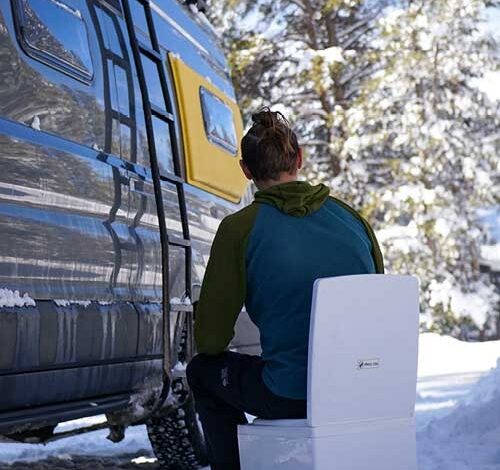A Throne With a View
CompoCloset’s composting toilet offers a chemical-free waste management solution for off-grid and beyond.

It’s often the least favorite part of camping. It stinks. It’s hard to get rid of without a sewer connection. It’s awkward.
It’s sh*t.
But Richard Peter has made sh*t his business.
It all started when the Europe/Australia-based entrepreneur and his life partner, Angela, decided to take some time off and travel in a van. They quit their jobs and dropped everything, including their recently renovated house that they rented out, and self-converted their van to hit the road.
“In 2020 he went from banking in London to building out his van on his parent’s driveway,” says Erica Pugh, co-founder and head of marketing of CompoCloset. Pugh is also Angela’s twin sister. “My sister said, ‘We’re not going in this thing without a toilet. And we’re not getting a chemical toilet. We’re getting a green toilet.’”
So, Peter found a toilet from a now competitor and put it in the van.
“They realized how great these toilets are. Composting toilets in general are really cool, but the competitor was a bit big and bulky and didn’t fit well. They had to redesign the van around it. Richard is a tinkerer and started working with it to make it fit better. He ended up designing his own,” says Pugh.
Pugh was in the spirits industry, where she did marketing for spirits and cocktail events — but that shut down during the pandemic. Thus, she was doing online marketing but had the capacity to help with CompoCloset.
“Richard and my sister came over here to visit us. We talked and tried to decide if we should try it out. We put up some Facebook ads to see if people would even be interested. We decided to do an Indie campaign and crowdfunded it. We raised more than $300,000. Only the top 5% to 10% of campaigns make that much,” Pugh says.
The group decided to start with a contract manufacturer to have the molds made.
“They are rather large injection molds. We reached out to Universal Plastic in California, and they returned our phone call. They continue to make our product,” she says.
Pugh says the more they learn about sanitation, the harder they strive to bring these types of toilets to more people at a more affordable cost.
“You save water, you get to stay off the grid longer and you save a lot of time. There are no chemicals, and depending on what you’re doing, you can actually engage composting stuff,” she says.
CompoCloset was born out of that vision.
Cuddy Cabin
CompoCloset currently offers two composting toilet options: the Cuddy and the Cuddy Lite. Strange names? Not really, Pugh explains.
 “The ‘Cuddy Cabin’ is where you go to the bathroom on a boat. The name first started in the nautical area. The ‘head’ on the boat is also where you go to the bathroom. The name of our products is a nod to the nautical arena and the history of composting toilets,” Pugh says.
“The ‘Cuddy Cabin’ is where you go to the bathroom on a boat. The name first started in the nautical area. The ‘head’ on the boat is also where you go to the bathroom. The name of our products is a nod to the nautical arena and the history of composting toilets,” Pugh says.
CompoCloset products separate your “ones and twos,” using a urine diverter that stops the formation of sewage.
“That’s the first bit of magic. With the addition of a composting agent, that kick-starts the composting process. We have two units; the original Cuddy has an agitator that fits more people’s needs and allows you to stay off-grid longer. The agitator aerates the poo more. It mixes it up and you get more poos for your buck. Out of our unit you get between 20 to 25 poos,” she says.
The Cuddy Lite is an agitator-less version of the Cuddy and is for those who want to be able to put a liner bag in the bin for easier cleaning. Some customers simply want to avoid using a composting agent and prefer to empty the bin after every use. Some like to add composting material after using it rather than stirring up the whole bin. Either way, you’re putting waste to good use.
As for a composting medium, Pugh says you need to use sawdust or another layering material, but she mostly recommends using coconut coir, especially for the agitator unit. Coconut coir helps reduce smell, attracts fewer pests and has a neutral pH balance.
“It’s a nice brown natural color, is quite absorbent and comes in nice practical bricks. It can be rehydrated. It’s easy to take with you instead of a larger bulking agent,” she says.
While it may seem like a lot of work, a composting toilet has many benefits over a portable chemical toilet. Portable chemical toilets need to be emptied every few days and waste water. When using a composting toilet, there’s no need to use chemicals and wastewater, which wastes more water and energy in the treatment process.
Closing the “Poop Loop”
Despite the benefits of a composting toilet, the smell might be the biggest worry for some customers.
Pugh says the good news is if it’s done right, the toilet shouldn’t smell like anything except forest floor because the composted material looks and smells earthy. There’s no need to externally vent the Cuddy Lite either, since there’s an integrated carbon filter to reduce odors.
“We have seen, especially in the U.S., that there are some people who prefer not to deal with the compost but still want a chemical-free toilet. In this case, you can start with a bag in it and layer. You don’t get quite as many poos, but this way, they can get rid of it,” Pugh says. She admits that composting involves a slight learning curve, and that for compost to be safe and pathogen-free for use, it takes six to 12 months — something you won’t have time for with a composting toilet.
“There are no composting toilets on the market that are able to complete the composting process right now,” she says. “You end up throwing it away in most cases. We’re not trying to greenwash it, and we’re looking for ways to close that poop loop. But you’re still saving water and not using chemicals.”
Everybody Poops
Since everybody poops, almost every market has a need for composting toilets. Especially small, portable ones. Pugh says that right now, their product is in the RV industry, marine industry, tiny homes and more, but van-life is where it all began.
“We do work with dealers and with different builders in the industry. We work with van builders doing custom builds, and we’re moving into the truck camper market as well. We’ve seen a large rise of private users in truck camping. Custom-built truck campers are quite price effective and a lot cheaper than vans. They can be a daily driver and also a camping thing,” she says.
The company is interested in working with different partners throughout the U.S., Canada and the United Kingdom.
“We’re talking with different RV manufacturers in the U.K., and with them we’re looking at making it an option to change out the chemical toilet for a composting one. It’s hard to put a composting toilet in standard, but we think being able to offer a swap it in/swap it out option would be great. We have plans for a new one that will be really good for the RV market.
“We think this is the best solution. The devil is in the details, and we’ve really done the details right. For example, our hinges are articulating so you can mount flush against the wall. We’ve made it very easy to clean and to use with the idea that certain bodies have issues with urine diversion. We’re very body inclusive.”
And it doesn’t hurt that “it’s super cute to look at,” Pugh says.
Sustainable & Accessible Sanitation
Pugh says what really differentiates CompoCloset is not necessarily the product itself, but the way their company works for the opportunity for everyone to use sanitation.
“We keep improving. We want to make sure it works for everyone in different applications. That is one of our key things. Our mission statement is, ‘Making sanitation more accessible and sustainable to help people along their journeys.’”
Besides their “kick-ass product,” Pugh says they have really great customer service with the goal of helping people and building a community.
“We are continuing to iterate and make better toilets. We consider ourselves a research company as well. We’re working with a university to make a better composting toilet and close that poop loop. Sanitation is a huge problem. In India alone, there are like 3 billion people who don’t have access to safe sanitation. We’re trying to address that on an individual level by developing a better toilet to help.”
From disaster area toilets with the simplest version of a urine diverter to festival toilets and tiny home living, CompoCloset is determined to make a better toilet, so the world has better access to sanitation.
“Everyone poops and everyone needs toilets. We’re just making one that can be better,” she says. “We love the conversation and the market research aspect of it. Even if we can’t help someone, we can learn more about something and try to address those issues later on.”


